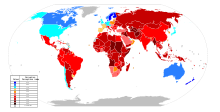- Corruption in Ghana
-
Political corruption 
Corruption Perceptions Index, 2010Concepts Electoral fraud · Economics of corruption
Nepotism · Bribery · Cronyism · Slush fundCorruption by country Angola · Armenia · Canada
Chile · China (PRC) · Colombia
Cuba · Ghana · India · Iran · Kenya
Ireland · Nigeria · Pakistan
Paraguay · Philippines · Russia
South Africa · Ukraine · Venezuela
· United StatesCorruption in Ghana has been common since independence. Since 2006, Ghana's score and ranking on the Transparency International Corruption Perceptions Index has improved slightly, ranked higher than Italy and Brazil.[1] However, there is a growing perception in Ghana that government-related corruption is on the rise.[1]
Corruption in Ghana
In a 1975 book, Victor T. Le Vine wrote that bribery, theft and embezzlement arose from reversion to a traditional winner-takes-all attitude in which power and family relationships prevailed over the rule of law.[2] Corruption in Ghana is comparatively less prevalent than in other countries in the region.[1]
Ghana is not a signatory to the OECD Convention on Combating Bribery. It has, however, taken steps to amend laws on public financial administration and public procurement. The public procurement law, passed in January 2004, seeks to harmonize the many public procurement guidelines used in the country and also to bring public procurement into conformity with World Trade Organization standards. The new law aims to improve accountability, value for money, transparency and efficiency in the use of public resources.[1]
However, some in civil society have criticized the law as inadequate. The government, in conjunction with civil society representatives, is drafting a Freedom of Information bill, which will allow greater access to public information. Notwithstanding the new procurement law, companies cannot expect complete transparency in locally funded contracts. There continue to be allegations of corruption in the tender process and the government has in the past set aside international tender awards in the name of national interest.[1]
Businesses report being asked for "favors" from contacts in Ghana, in return for facilitating business transactions. The Government of Ghana has publicly committed to ensuring that government officials do not use their positions to enrich themselves. Official salaries, however, are modest, especially for low-level government employees, and such employees have been known to ask for a "dash" (tip) in return for assisting with license and permit applications.[1]
Anti-corruption efforts
The 1992 Constitution provided for the establishment of a Commission for Human Rights and Administrative Justice (CHRAJ). Among other things, the Commission is charged with investigating all instances of alleged and suspected corruption and the misappropriation of public funds by officials. The Commission is also authorized to take appropriate steps, including providing reports to the Attorney General and the Auditor-General, in response to such investigations. The Commission has a mandate to prosecute alleged offenders when there is sufficient evidence to initiate legal actions. The Commission, however, is under-resourced and few prosecutions have been made since its inception.[1]
In 1998, the Government of Ghana also established an anti-corruption institution, called the Serious Fraud Office (SFO), to investigate corrupt practices involving both private and public institutions. A law to revise the SFO law is being drafted and it is expected to define more clearly treatment of the proceeds from criminal activities. The government also announced plans to streamline the roles of the CHRAJ and SFO, in order to remove duplication of efforts. The government passed a “Whistle Blower” law in July 2006, intended to encourage Ghanaian citizens to volunteer information on corrupt practices to appropriate government agencies. In December 2006, CHRAJ issued guidelines on conflict of interest to public sector workers. As of February 2009, a Freedom of Information bill was still pending in Parliament.[1]
References
- ^ a b c d e f g h 2009 Investment Climate Statement: Ghana. Bureau of Economic, Energy, and Business Affairs, U.S. Department of State (February 2009).
 This article incorporates text from this source, which is in the public domain.
This article incorporates text from this source, which is in the public domain. - ^ Victor T. Le Vine (1975), Political corruption: the Ghana case, ISBN 9780817913816, http://books.google.com/books?id=D651QgAACAAJ
 Ghana topics
Ghana topics 
Government and politics Corruption · Elections · Flag · Foreign relations · Governments · Ministries and Agencies · Ministers · Parliament · Political parties · President · LGBT rights · Immigration to GhanaGeography Economy Health Ministry of Health · Ghana Health Service · NHIS · Christian Health Association of Ghana · Eyecare · Optometry · OpticianReligion Law Judiciary · Human rightsSports Culture and society Other topics  Years in Ghana ·
Years in Ghana ·  Ghana templates ·
Ghana templates ·  Economy of GhanaCategories:
Economy of GhanaCategories:- Corruption by country
- Economy of Ghana
- ^ a b c d e f g h 2009 Investment Climate Statement: Ghana. Bureau of Economic, Energy, and Business Affairs, U.S. Department of State (February 2009).
Wikimedia Foundation. 2010.
